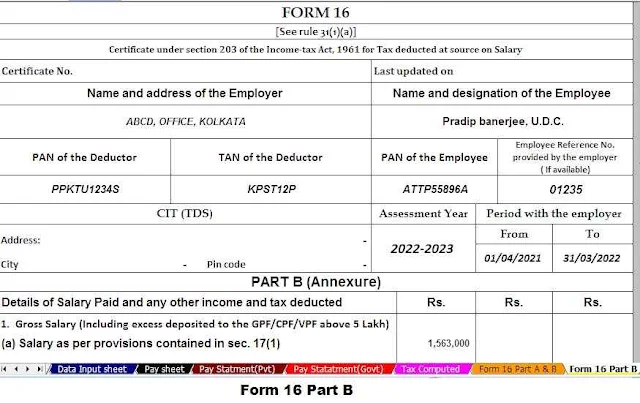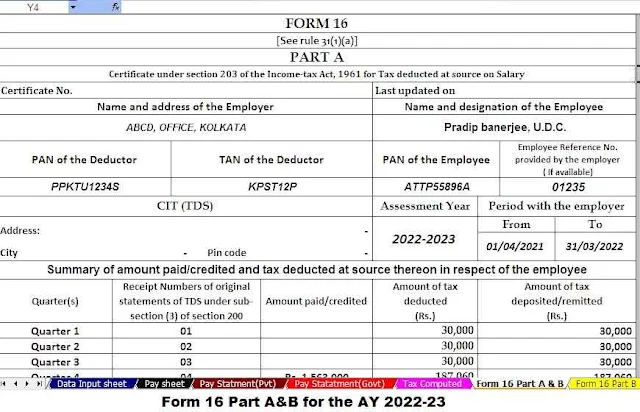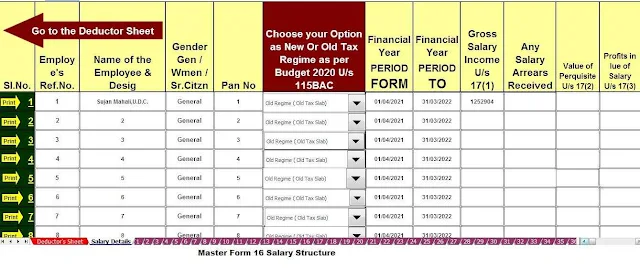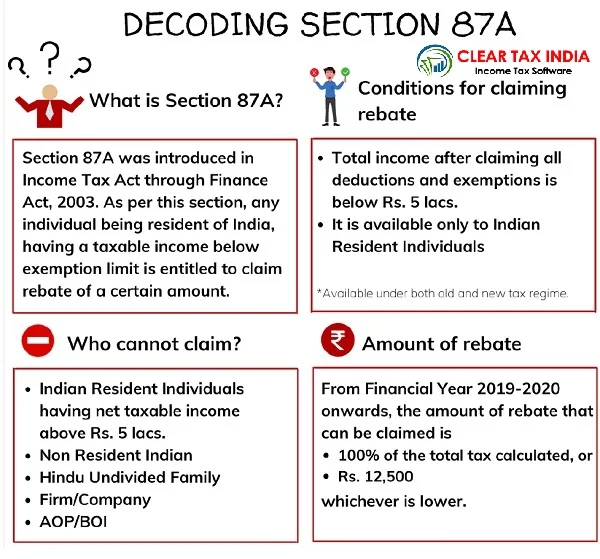Income Tax exemption to the disabled person Section 80U is given tax deductions for
those who have at least 40% disability under the law. There are several criteria for this and a specific
set of procedures for claiming this deduction under section 80U.
Section 80U deals with tax
deductions for residents of
Definition of disability
Disability is defined as a
disability of at least 40% in a person, confirmed by the competent medical
authorities. Persons with disabilities are defined under the Persons with
Disabilities (Equal Opportunity, Protection of Rights and Full Participation)
Act, 1995, enacted by the government. Disability is mainly divided into 7
categories:
Download and prepare One by One Form 16 Part A&B for the F.Y.2021-22
Poor vision: Poor vision refers to
people with visual impairments that cannot be corrected with surgery but can
still use their vision with other devices.
Blindness: Blindness is defined as
total loss of vision or limited field of vision to an angle of 20 degrees or
worse, or visual acuity of less than 6160 after corrective lenses.
Hearing impairment: hearing loss of
at least 60 decibels.
Cured of leprosy: People who have
been cured of leprosy but have lost sensation in their legs or arms and paresis
of the eyelids and eyes. Even the elderly or people with extreme deformities
prevent them from engaging in any useful activity.
Mental retardation: people with
incomplete or delayed development of mental abilities, resulting in a subnormal
level of intelligence.
Musculoskeletal Disability: People
with severely limited movement of the limbs due to a disability in the
articular muscles or bones.
Mental illness: other mental
disorders not associated with mental retardation.
The law also defines severe
disability in addition to disability. Severe disability refers to a condition
in which a person suffers from 80% or more of the disability in the categories
mentioned above. Severe disability also began to include multiple disabilities,
cerebral palsy and autism.
Download and prepare One by One Form 16 Part B for the F.Y.2021-22
These Section 80U Exemptions are
allowed at Rs 1.25 lakh for severely disabled persons and Rs 75,000 for persons
with disabilities.
How can I claim Section 80U
benefits?
There are no documentation
requirements other than a certificate from a recognized medical institution
confirming the disability. There is no need to submit bills or other items
incurred as the cost of treatment or any other expenses.
Section 80U gives tax Exemptions for those who have at least 40% disability under the law. There are various
criteria for this and a specific set of procedures for obtaining this deduction
under Section 80U.
Section 80U deals with tax
deductions for residents of
Definition of disability
Download and prepare at a time 50 employees Form 16 Part A&B for the
F.Y.2021-22
Disability is defined as a
disability of at least 40% in a person, confirmed by the competent medical
authorities. Persons with disabilities are defined under the Disability (Equal
Opportunity, Protection and Full Participation) Act of 1995, issued by the
government. Disability is mainly divided into 7 categories:
Poor vision: Poor vision refers to
people with visual impairments that cannot be corrected with surgery, but who
can still use their vision with other devices.
Blindness: Blindness is defined as
total vision loss or visual field restriction of 20 degrees or worse, or visual
acuity below 6160 after corrective lenses.
Hearing impairment: hearing loss of
at least 60 decibels.
Healed leprosy: People who have
recovered from leprosy but have lost sensation in the legs or arms and paresis
of the eyelids and eyes. Even elderly people or people with extreme deformities
prevent them from carrying out any user activity.
Download and prepare at a time 50 employees Form 16 Part B for theF.Y.2021-22
Mental retardation: People with
incomplete or delayed development of mental abilities, resulting in a subnormal
level of intelligence.
Musculoskeletal motor
insufficiency: People with severely limited limb movement due to impaired
functioning of the joint muscles or bones.
Mental Illness: Other mental
disorders not associated with mental retardation.
The law also defines severe
disability separately from disability. Severe disability refers to a condition
where a person suffers 80% or more of the disability in the above categories.
Severe disability also began to include multiple disabilities, cerebral palsy,
and autism.
Deductions Section 80U
Section 80U deductions are
available at Rs 1.25 lakh for severe disability and Rs 75,000 for people with
disabilities.
These limits have been increased
from the previous limits of Rs 1 lakh for severe disability and Rs 50,000 for
disability. The changes take effect from the 2020-21 evaluation year.
Download and prepare at a time100 employees Form 16 Part A&B for the
F.Y.2021-22
How do I get Section 80U benefits?
No documents other than a
certificate from a recognized medical institution certifying disability are
required. It is not necessary to present invoices or other items incurred as a
cost of treatment or any other expense.
However, you need to complete
various modules for mental illness and other disabilities. Likewise, Form 10-IA
for children with cerebral palsy and autism must be completed.
To make an application, you must
provide a medical certificate of disability and a Section 139 tax return for
the relevant assessment year.
If your disability assessment
certificate has expired, you can still request deductions in the year that the
certificate expires.
However, starting next year, a new
certificate will be required to benefit from Section 80U benefits.
Certifications can be obtained from
government-licensed medical bodies, which may include a physician in neurology,
paediatrician, urologist, chief medical officer (CMO), or civil surgeon at a
government hospital.
It should be mentioned here that
Section 80DD also applies if a person has paid a premium to care for a disabled
dependent. Dependent means any member of a united Hindu family (HUF) or
siblings, parents, spouse or children. As regards the limits to the deduction,
they are the same as those referred to in Section 80U.
Download and prepare at a time 100 employees Form 16 Part B for the F.Y.2021-22
Section 80U Frequently Asked
Questions
1. Can a person with a proven
disability of 44% receive tax deductions under section 80U?
Yes, you can take advantage of the
tax deductions provided in section 80U. It should be noted that the percentage
of disability established for the deductions referred to in the section is
between 40% and 80%.
2. What is the Section 80U
deduction?
Deductions of up to Rs 1.25,000 can
be claimed. The indicated amount can be requested if the person has an 80%
disability. For people whose disability is greater than 40% and less than 80%,
the deduction is Rs 75,000.
3. Have the deduction limits for
the disabled changed?
Yes, the deduction limits for the
disabled have been changed. The new limits take effect from the 2020-21
assessment.
4. How many categories is the
disability divided into?
Disability is divided into seven
categories. These are vision problems, blindness, hearing problems, leprosy
treatments, mental retardation, impaired musculoskeletal system, and mental
illness.
5. Are autism, cerebral palsy and
multiple disabilities considered severe disabilities?







